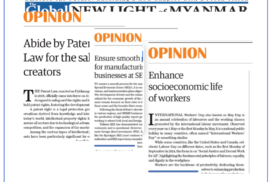By U Khin Maung (A retired diplomat)
1. In my second article on this topic, I mentioned that this article is very delicate, difficult, dedicated and long. It is my intention to explain my ordinary, simple, basic and layman’s views. As intended, this is my third humble and honest attempt in alphabetical order.
A (continued)
Aggression and aggressiveness
The president promised that those responsible for the aggression would be punished.
The noun aggression, meaning unprovoked attack, is about an act or a fact.
His aggressiveness was blamed on a lack of parental affection.
The noun aggressiveness, meaning hostility, is about a tendency or a mood.
• An attack in response to an aggression is called a retaliation.
All and all-
The English batsmen were all powerful strikers of the ball.
The word all in that sentence means everyone.
The Indian batsmen were all-powerful in their last match.
The adverb all- means completely.
The Australian bowlers toiled all day.
The adjective all means the whole.
All and every
All men are born equal.
We use the adjective all when we mean the whole lot.
Every man is born equal.
We use the adjective every when we mean every single one.
• Use every when referring to things countable.
All ready and already
The runners were all ready at the starting line.
All ready means that the whole lot was prepared.
The runners were already at the starting line.
Already means that the runners were at the starting line by this time.
All right and alright
His answers to the questions were all right.
All right means that his answers were entirely correct.
• Alright has not been accepted as a contraction of all right and should not be used. It is, however, quite common.
All together and altogether
The audience started to sing the national anthem all together.
All together means as a group.
That is a different question altogether.
Altogether means totally or completely.
Allusion and reference
The manager’s report contains an allusion to the behaviour of an unnamed member of his staff.
The essential thing about the word allusion is that it hints at but does not identify or specify.
The manager’s report contains a reference to the behaviour of Mr Jones, a member of his staff.
Prefer the word reference to allusion if there is a specific identification.
• The word illusion, meaning of deceptive appearance, is sometimes mistakenly used for allusion.
Alternative and choices
The alternative suggestion does not appeal to me.
The use of alternative implies that there are two things from which to choose.
Only one of the choices I have been given appeals to me.
The use of choices implies that there are more than two things from which to choose.
Always and normally
I always drink orange juice at breakfasttime.
The adverb always means without exception. The word should not be qualified by almost, or nearly.
I normally drink orange juice at breakfasttime.
The adverbs normally, generally, usually mean with an occasional exception.
• The word always is often worth a second thought.
Amend and emend
The government has decided to amend the taxation laws.
Amend means to change or to alter.
The typist was asked to amend the annual report.
Emend means to remove errors from.
Amiable and amicable
My boss is always very amiable.
Use amiable, meaning friendly, for living things.
His cocktail parties are always very amicable.
We came to an amicable arrangement.
Use amicable, meaning friendly, for events.
Reference:
English problem words by George Jerkings, London.














